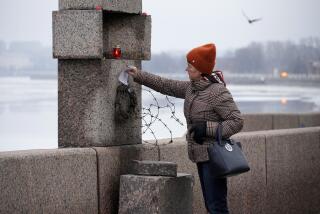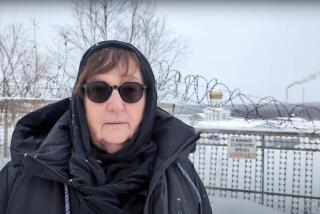Russia Ends Search for Sub Survivors
MOSCOW â Russia turned to the task of retrieving 118 seamenâs bodies and twin nuclear reactors from a sunken submarine Monday after a bumbling weeklong search for survivors that left the government chastened by charges of ineptitude.
âOur worst fears are confirmed,â Vice Adm. Mikhail Motsak, chief of staff of Russiaâs Northern Fleet, announced to a nation still stunned by its deadliest peacetime naval disaster. âAll compartments of the submarine are flooded with water. None of the crew is still alive.â
âMothers, forgive me for not bringing back your sons,â Adm. Vyacheslav Popov, the fleet commander, added in an emotion-choked voice on national television from a missile cruiser in the Barents Sea.
Three hundred and fifty feet below, Norwegian and British divers had pried open and entered the rear escape hatch of the submarine Kursk at 7:45 a.m., achieving in 24 hours what the Russian navy had failed to do in the week after a mysterious explosion ripped the sub open Aug. 12.
After hearing the diversâ confirmation of stem-to-stern flooding, Russia asked Norway to take charge of extracting the bodies from their Arctic tomb. The Russian navy has neither the diving equipment nor the expertise to do so.
Russian officials also said they would seek foreign funds to help raise the mangled 500-foot Oscar II-class sub, which went down during Northern Fleet maneuvers with some of the navyâs most advanced weapons and equipment on board.
Scores of friends and relatives of the dead sailors landed in the Barents Sea port of Murmansk on a charter flight from Moscow a few hours after the search was called off. Their faces were frozen in grief.
Eager to muffle a storm of public criticism, the navy hustled the bereaved group past reporters and whisked it in a convoy of buses and emergency vehicles to the base that was the subâs home port.
Russians have been echoing the relativesâ anguish over sluggish rescue work, repeated lies by officials about the effort, inadequate rescue equipment and President Vladimir V. Putinâs reluctance to interrupt his vacation or call for foreign help.
The chairman of parliamentâs upper house called Monday for a parliamentary investigation into the disaster and the state of Russiaâs impoverished armed forces.
âThe fog that was built up around this tragedy must be dissolved,â said Sergei V. Ivanenko, a parliament member. âSociety should know the answer to the one question that stands before it: Was everything done to save people?â
Putin Orders Aid, Counseling for Families
The beleaguered president ordered his government to triple the amount of aid given to each dead sailorâs family, to the equivalent of $450. He also ordered teams of psychologists to offer the families grief counseling.
And his defense minister, Igor D. Sergeyev, went on television to defend efforts by 3,000 Russian sailors to save the crew, while acknowledging some unspecified mistakes.
Beyond the awkward official efforts at closure lies a new set of complex and dangerous challenges that will make the Kursk a burden on Russiaâs leadership for months.
Entering the vessel will now become an imperative exercise to salvage bodies, avoid nuclear contamination of the sea and perhaps clear up the mysteries of what sent it to the ocean bottom.
Amid an emotional debate on the wisdom of diving for the bodies, Foreign Minister Igor S. Ivanov asked Norwegian officials Monday to organize such an attempt.
The Norwegian government said it would bear the multimillion-dollar cost--as long as Stolt Offshore, the Norwegian oil company whose British and Norwegian rescue divers reached the sub, accepts the new task. Julian Thompson, a company spokesman, said the request was being studied.
âSafety is our overriding consideration,â Thompson said. âThere would be a lot of debris in the sub from the explosions, along with nuclear reactors and ammunition about which we have no detail. It would take weeks of planning to make a recovery mission safe.â
He said the Kurskâs escape hatch was too narrow to enter; divers would have to cut new openings in the hull. With winter already approaching in the Arctic region, such an undertaking could carry over to next spring.
Retrieving Bodies Called âStupid Ideaâ
Rudolf A. Golosov, a retired Soviet vice admiral, said going down 350 feet for the bodies on the Kursk seemed an unacceptable risk of the diversâ lives.
Golosov said he initially resisted--but then obeyed--orders to recover bodies from a Soviet sub that sank off the Pacific port of Vladivostok in 1982. That sub sank in water less than half the depth of the water in which the Kursk rests.
âIt was a stupid idea then, and itâs a stupid idea now,â he said.
âThe old imperial Russian navy had a ritual of burying dead sailors at sea,â he added. âLetâs face the facts. The dead [of the Kursk] already have a grave.â
But Konstantin Argelade, a civilian diver in Murmansk, said public anger would boil over if the bodies were left at sea. Hauling them up âis a very costly exercise, but it has to be done,â he said.
Russian officials have suggested a precarious alternative--lifting the submarine with giant pontoons and dragging it with surface ships to shallower waters for easier access.
The Soviet Union lost three submarines in deeper waters and left them there, mainly because of the enormous cost of raising them. But the Kursk lies relatively close to the surface, on a continental shelf in the Northern Fleetâs exercise area.
Deputy Prime Minister Ilya I. Klebanov said the government would seek foreign funding to raise the Kursk and draw up plans within weeks. He gave no target figure; some specialists say the task would cost at least $100 million.
One risk of raising the sub would be damage to the twin nuclear reactors that powered the vessel and, according to the navy, shut down automatically when the accident occurred. One risk of not raising the sub would be corrosion of pipes in the reactorsâ cooling mechanisms, which might set off a radiation leak.
The speed of corrosion often intensifies in icy, salty water, said Alexander Nikitin, a retired Russian navy captain, who estimated that a leak could come in about a month.
Some environmentalists are urging the government to send divers to seal off the reactor--another risky, costly venture.
Answers to Sensitive Questions
Raising the Kursk would certainly help naval investigators answer two sensitive questions about the disaster: How many sailors survived the explosions, only to die as Russian authorities moved slowly to the rescue? And was the accident caused by an explosion on board, as U.S. and Norwegian intelligence suggests, or by a collision, as some Russians say?
Klebanov, heading a government investigation, has said most of the crew, including all officers on the bridge, died within the first two minutes after the sub went down. As many as six of the subâs nine compartments were flooded, and the others filled slowly with seawater, he said.
Various theories have been offered about the cause of the sinking.
The official armed forces newspaper, Krasnaya Zvezda, speculated on its Web site Friday that a liquid fuel cartridge may have exploded when the subâs crew tried to fire a torpedo. The paper said the Kurskâs torpedo bay may have been carrying a new model of liquid fuel apparatus that sailors have criticized as dangerous to store and handle.
A team led by Klebanov announced Saturday that the Kursk apparently hit an object near the surface--possibly a mine or a ship weighing 8,000 tons or more--and then plunged to the bottom and exploded. He said the object could have been a foreign submarine, either British or American. Two U.S. subs and a British one were monitoring the Russian naval exercise from an undisclosed distance when the Kursk sank.
Sergeyev, the Russian defense minister, said on television Monday that Russia had asked the North Atlantic Treaty Organization whether any of its ships got close to the exercises.
âWe were told no,â he said. âBut in the course of the conversation they added an odd phrase that, even if such an incident did happen, they would never admit it.â
Boudreaux reported from Moscow and Dixon from Murmansk. Staff writer Kirsten Studlien in London and Sergei L. Loiko of The Timesâ Moscow Bureau contributed to this report.
More to Read
Sign up for Essential California
The most important California stories and recommendations in your inbox every morning.
You may occasionally receive promotional content from the Los Angeles Times.










